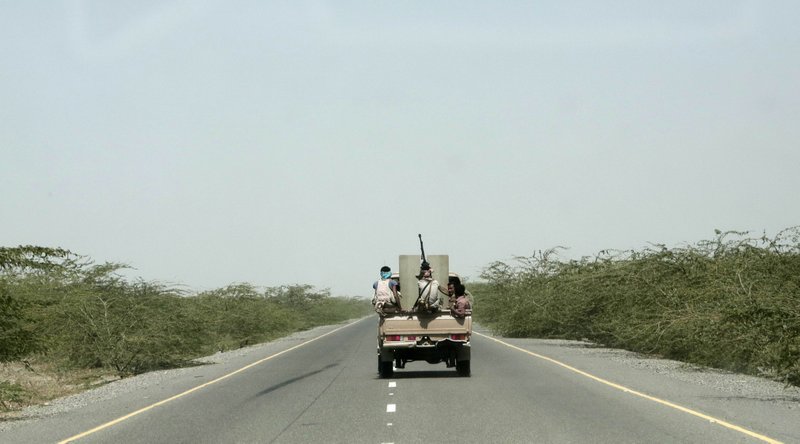DUBAI, United Arab Emirates -- A Saudi-led coalition conducted a fierce assault Wednesday on the Yemeni port city of Hodeida, the biggest offensive of the yearslong war in the Arab world's poorest nation.
The attack on the Red Sea port aimed to drive out Iranian-aligned Shiite rebels known as Houthis, who have held Hodeida since 2015. But the operation has led to fears that a protracted fight could force a shutdown of Hodeida's port at a time when millions of people are at risk of starvation.
About 70 percent of Yemen's food enters through the port, as well as the bulk of humanitarian aid and fuel supplies. About two-thirds of the country's population of 27 million relies on aid, and 8.4 million are already at risk of starving.
Before dawn Wednesday, convoys of vehicles appeared to be heading toward the rebel-held city as heavy gunfire rang out. The assault, part of an operation dubbed "Golden Victory," began with coalition airstrikes and shelling by naval ships, according to Saudi-owned satellite news channels and state media outlets.
Bombardment was heavy, with one aid official reporting 30 strikes in 30 minutes.
"Some civilians are entrapped, others forced from their homes," said Jolien Veldwijk, the acting country director of the aid group CARE International, which works in Hodeida. "We thought it could not get any worse, but unfortunately we were wrong."
About 2,000 troops who crossed the Red Sea from a United Arab Emirates naval base in the African nation of Eritrea were awaiting orders to move in from the west after Yemeni government forces seize Hodeida's port, Yemeni security officials said.
United Arab Emirates forces backing Yemeni government troops moved in from the south near Hodeida's airport, while others sought to cut off Houthi supply lines to the east, the officials said.
Yemen's exiled government "has exhausted all peaceful and political means to remove the Houthi militia from the port of Hodeida," it said in a statement. "Liberation of the port of Hodeida is a milestone in our struggle to regain Yemen from the militias."
Four United Arab Emirates soldiers were killed in Wednesday's assault, the United Arab Emirates' state-run news agency said. The report gave no details of how they died.
Forces loyal to Yemen's exiled government and fighters led by United Arab Emirates troops had neared Hodeida in recent days. The port is about 90 miles southwest of Sanaa, Yemen's capital, which has been in Houthi hands since September 2014. The Saudi-led coalition entered the war in March 2015.
The United Nations and other aid groups already had pulled their international workers from Hodeida ahead of the assault.
The port remained open, however. Several ships arrived in recent days, including oil tankers, and there was no word from the coalition or the U.N. to stop work, according to a senior port official.
Aid groups nevertheless warned of disaster.
Robert Mardini, the regional director for the Red Cross, said the push on Hodeida "is likely to exacerbate an already catastrophic humanitarian situation in Yemen."
"The population has already been weakened to extreme levels," he said.
David Miliband, the head of the International Rescue Committee, called the offensive "an attack on the political and diplomatic process to bring peace to Yemen." He said the U.N. Security Council must act to secure a cease-fire.
The Security Council plans to hold an emergency meeting today.
More than 10,000 people have been killed in Yemen's civil war, which has displaced 2 million others and helped spawn a cholera epidemic. Saudi-led airstrikes have killed large numbers of civilians and damaged vital infrastructure.
The U.N. and Western nations say Iran has supplied the Houthis with weapons, including assault rifles and the ballistic missiles they have fired deep into Saudi Arabia, including at the capital, Riyadh.
The coalition has blocked most ports, letting supplies into Hodeida in coordination with the U.N. The air campaign and fighting have disrupted other supply lines, causing an economic crisis that makes food too expensive for many to afford.
The U.N. says about 600,000 people live in and around Hodeida. Already, Yemeni security officials said some were fleeing the fighting.
Late Wednesday, the Saudi and United Arab Emirates governments announced what they called a "multifaceted plan" to protect civilians in Hodeida, including establishing routes for food, medical supplies and oil shipments from Saudi Arabia's southern city of Jizan and the UAE's capital, Abu Dhabi.
The U.S. has been supplying targeting information to the Saudi-led coalition, as well as refueling their warplanes, but it was not involved in military operations at the port, Pentagon spokesman Maj. Adrian Rankine Galloway said.
"We do not provide any additional support to the Saudi coalition's military operations," he said.
Information for this article was contributed by Ahmed al-Haj, Maggie Michael, Samy Magdy and Lolita C. Baldor of The Associated Press.
A Section on 06/14/2018

